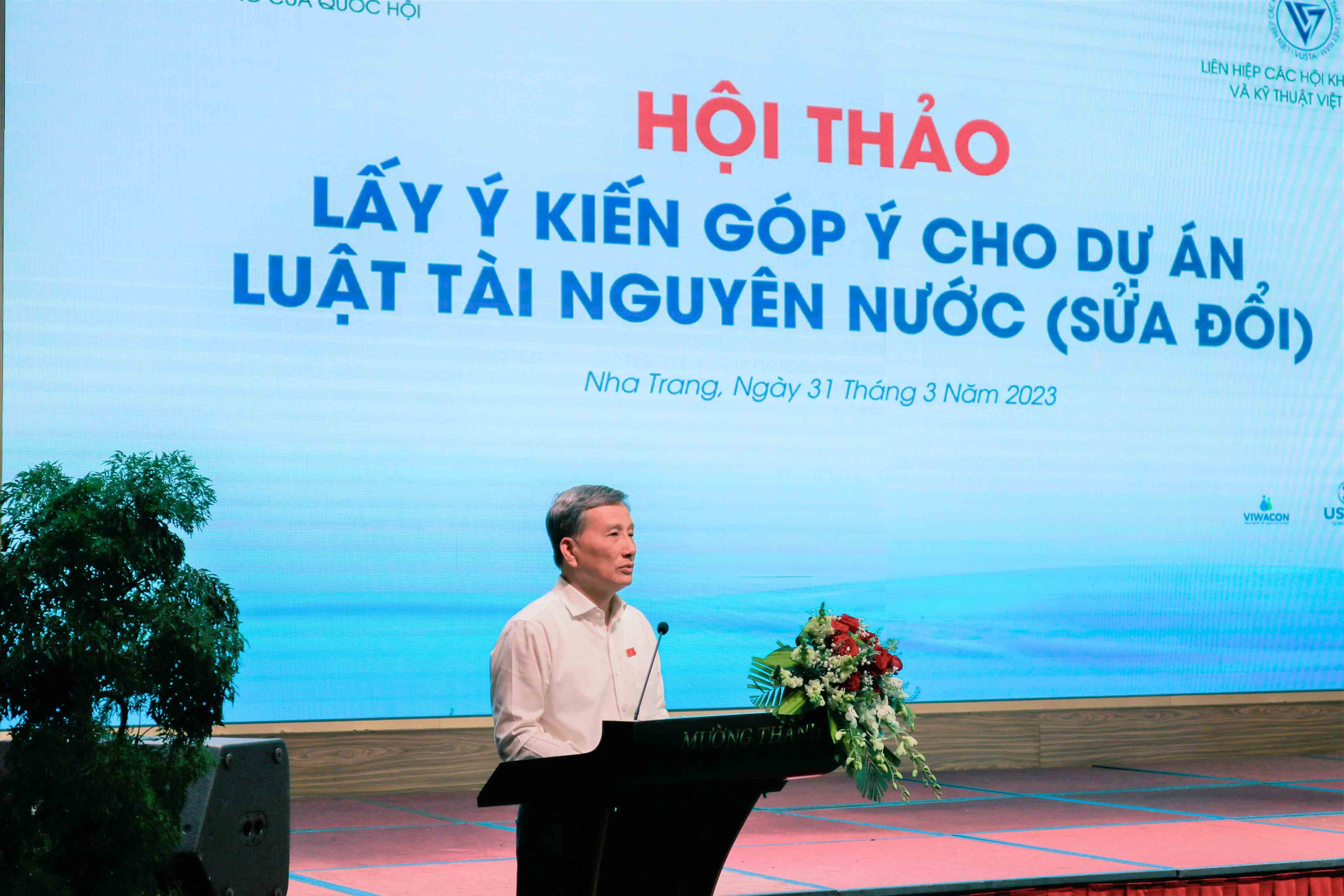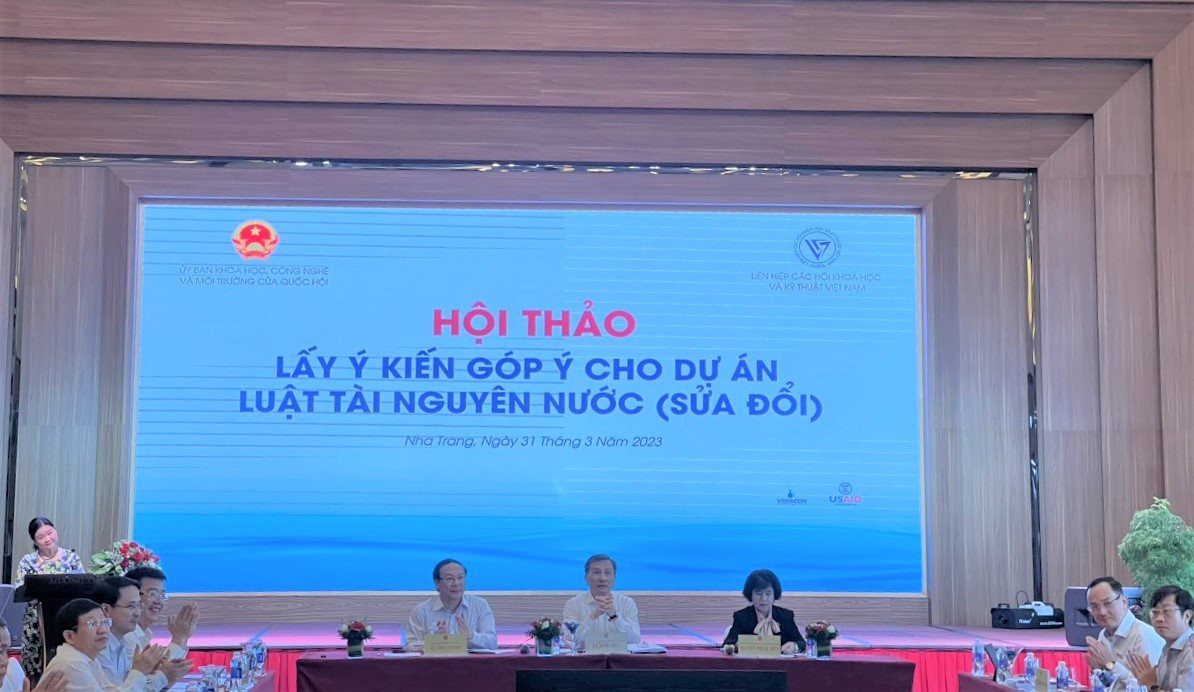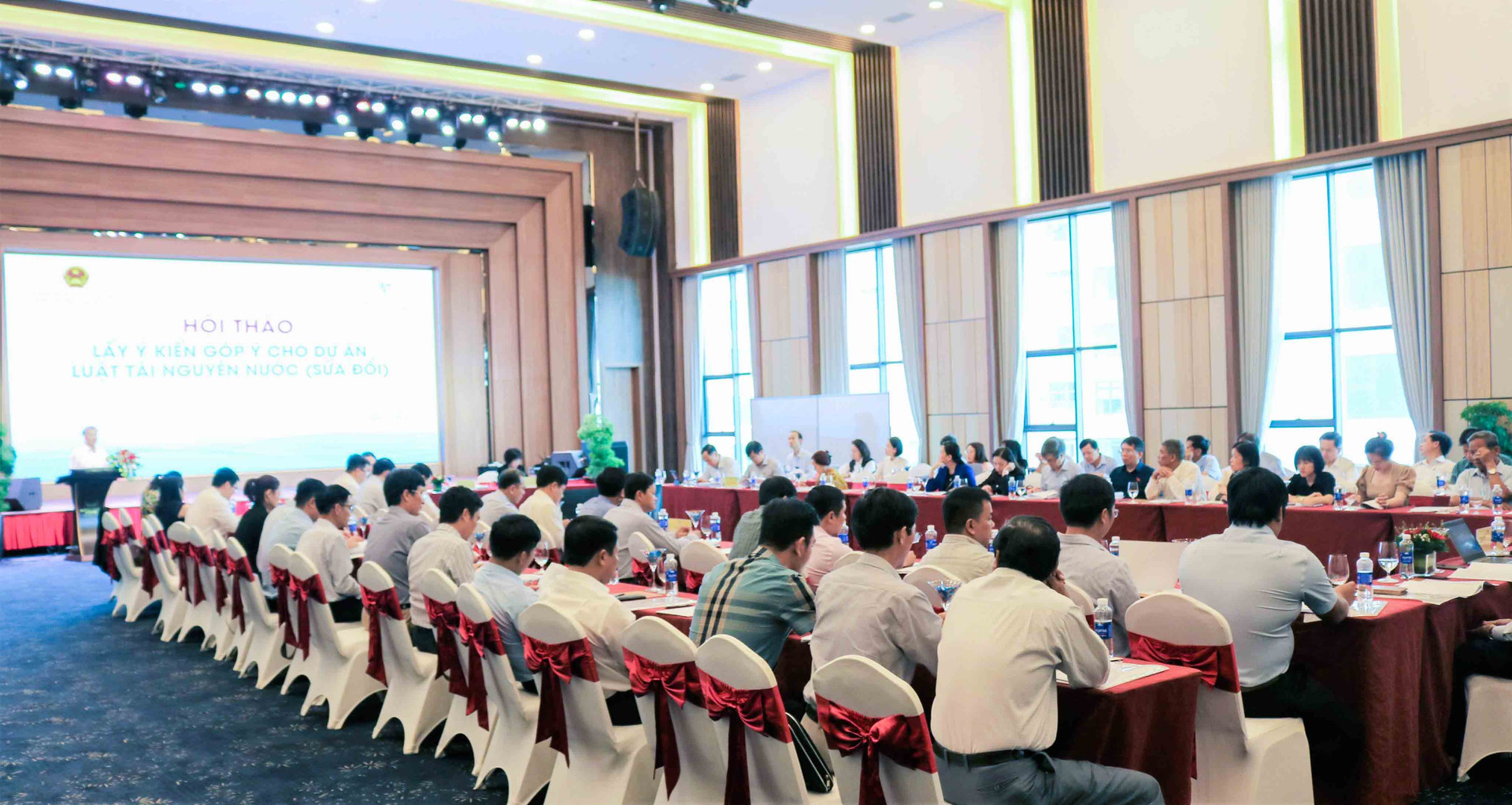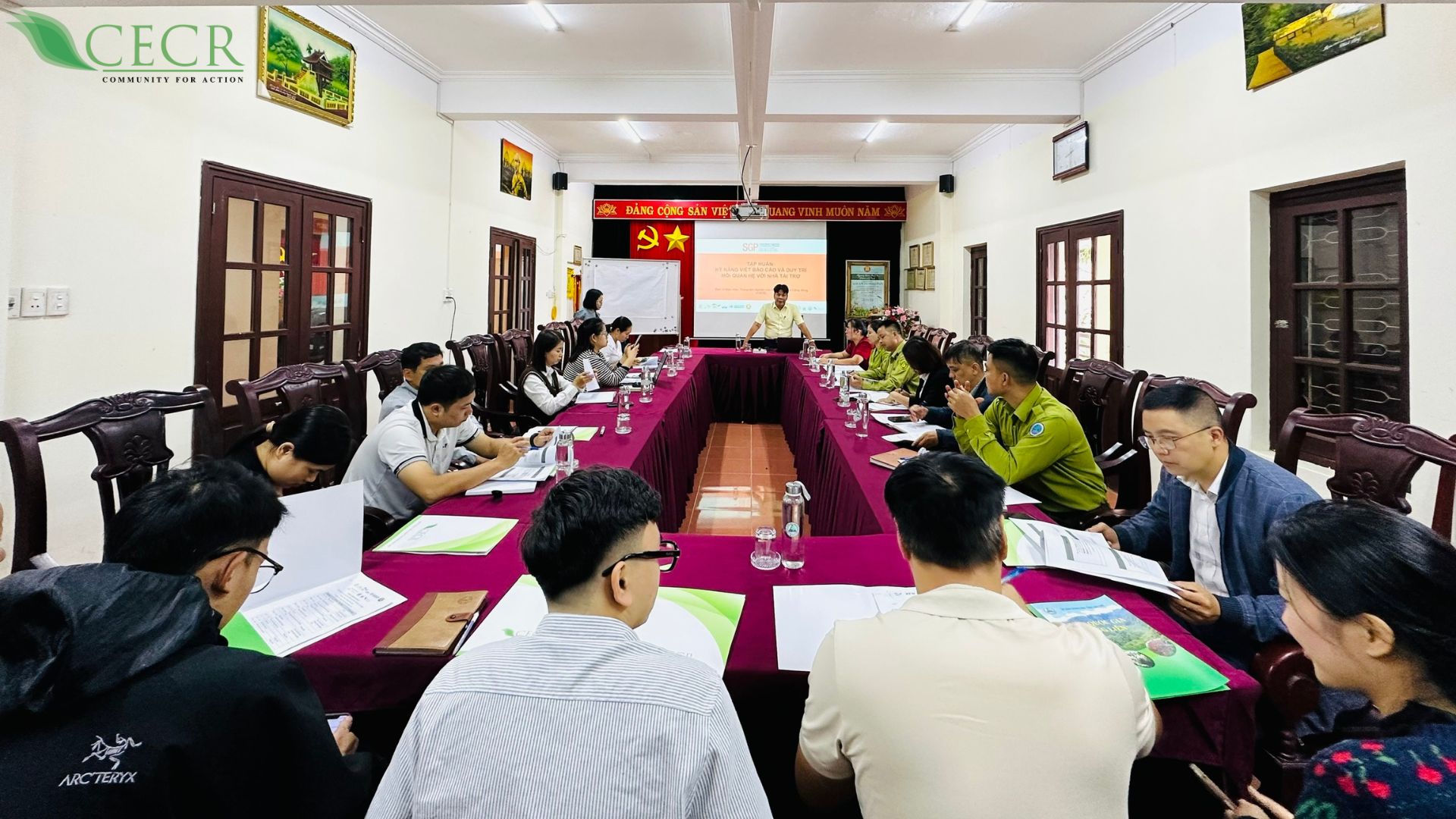(TN&MT) – On March 31, in Khanh Hoa, the National Assembly’s Committee for Science, Technology and Environment held a workshop to collect comments on the draft Law on Water Resources (amended) in the region. Central and Central Highlands. Chairman of the Science, Technology and Environment Committee of the National Assembly Le Quang Huy; Vice Chairman of the Science, Technology and Environment Committee of the National Assembly Nguyen Thi Le Thuy and Deputy Minister of Natural Resources and Environment Le Cong Thanh chaired the workshop.
Adapting the Law on Water Resources: Ensuring consistency, synchronization, avoiding interference, overlapping


Accordingly, the Draft Law on Water Resources (amended) closely follows the four policies approved by the National Assembly in Resolution No. 50/2022/QH15 dated June 13, 2022, including: ensuring water source security; socialization of the water sector; economics of water resources; protect water resources, prevent harm caused by water and propose amendments and supplements to a number of other policies.
The draft Law on Water Resources (amended) was submitted by the Government to the National Assembly according to Report No. 37/2023 dated February 17, 2023, including 10 chapters and 88 articles, basically keeping the same number of chapters as the 2012 Law on Water Resources. ; Specifically, 10 articles were kept unchanged, 62 articles were amended and supplemented, 16 new articles were added and 8 articles were annulled.
Many new points in the draft Law on Water Resources (amended)
Introducing some new points of the draft Law on Water Resources (amended), Mr. Chau Tran Vinh, Director of the Department of Water Resources Management said that the draft Law has supplemented regulations to ensure water security. The country throughout the entire draft Law adopts regulations to ensure the quantity of water, the quality for the purposes of use, to ensure the ecology and environment, and to reduce the harm caused by water. In particular, specific regulations on the regulation and distribution of water resources, especially in drought and water shortage conditions (Article 39, Article 40).
Supplementing regulations on management, exploitation and use of water to control water exploitation and use, which must be in accordance with the intended use, in accordance with the function of the water source (Article 26), and the capacity of the water source. and ensure minimum flow in rivers and streams (Article 28), the threshold for groundwater exploitation (Article 29); specific regulations on monitoring activities of water exploitation and use in the direction of the connection, automatic data transmission continuously and responsibilities of organizations and individuals in monitoring activities of exploitation and use of water resources (Article 57).
Supplementing regulations on prevention and control of landslides and landslides, riverbanks and lakes (Article 66) and regulations on making and publicizing the list of lakes, ponds and lagoons that cannot be levelled (Article 63) to strengthen the protection of water sources with functions of regulating, preventing inundation and protecting the environment.
Regulations on responsibilities of MONRE, ministries, local branches, organizations and individuals in developing scenarios to respond to, regulate and allocate water sources in the event of a drought, or lack of water, and to regulate and distribute water resources. distribution of water sources in case of drought or water shortage (Article 39, Article 40).
Supplementing regulations to clearly define the responsibility for the management of water resources and the management of water exploitation works at both central and local levels in the entire draft Law (Article 79, Article 80). Towards water resource management on the basis of digital technology, unifying the database, building a set of tools to support decision-making in real-time, reducing management and operation personnel, and investment costs. private investment of the state (Article 42).
In particular, the draft Law is developed in the direction of separating the integrated and unified management of water resources from the management and operation of water exploitation and use works (irrigation works, hydroelectric power plants, urban water supply). , rural areas, industrial and service water supply, waterway transport…); and at the same time resolve the overlaps, intertwining, conflicts, and loopholes in the laws.
In addition, there are a number of new revised and supplemented contents such as information systems, data on water resources (Article 10); underground water protection (Article 33); artificial addition of underground water (Article 43); types of exploitation and water-using works that require permits (Article 47); preventing and combating drought, flood, inundation and artificial inundation (Article 63); treatment plan for inefficient exploitation and use of water, causing degradation, depletion and pollution of water sources (Article 36). Remove regulations on conditions of consulting units for planning and basic survey of water resources.
Many businesses and scientific organizations contributed ideas to the draft Law
At the workshop, the delegates highly appreciated the content of the draft Law on Water Resources (amended) developed by the Ministry of Natural Resources and Environment and said that the draft Law has been amended and supplemented to meet the increasing practical requirements. increase in exploitation of water resources, protection, restoration and assurance of national water source security, adaptation to climate change, and at the same time in line with new guidelines and policies in water resource management. In addition, many businesses, hydropower companies, companies exploiting irrigation works, and scientific organizations contributed ideas to the draft Law.

Commenting on point a, Clause 3, Article 28 of the draft Law, Mr. Duong Tan Tuong, Deputy Director of Vinh Son – Song Hinh Hydropower Joint Stock Company proposed to supplement regulations on determining river flows, Streams and downstream of reservoirs must ensure the following principles: “It must be done for each specific location on rivers and streams and must ensure systematicity in the river basin, not greater than the flow to the lake at the same time. point”. Because if there is no reservoir, the minimum flow is only equal to the flow to the lake.
Regarding the content of registration and licensing of exploitation and use of water resources, the representative of Binh Dinh Irrigation Works Exploitation Co., Ltd. proposed the Drafting Board reconsider the cases that must be registered and licensed for exploitation. , use of water resources in Clause 1, Article 47 of the Draft Law on canals and canal-blocking works. Because this type of work has a large number, the registration and licensing of all these works will overlap, and be very complicated, time-consuming and costly. At the same time, it is proposed to stipulate that for the works built, put into operation and used before the Law on Water Resources No. 17/2012/QH13 dated June 21, 2012, is issued, they can set up the procedure for granting a permit. to create conditions for operators to prepare and submit to the Department of Agriculture and Rural Development or the local Department of Natural Resources and Environment for approval.
According to Ms. Nguyen Ngoc Ly, Chairman of the Board of Directors of the Center for Environmental and Community Research, currently, many models of water resource protection with the participation of the community have been effective. However, most of the models are experimental and self-governing, and the scalability and maintenance of the models are still difficult due to institutional, managerial, financial and technical barriers.
To promote community participation in water resource management, Ms. Nguyen Ngoc Ly proposed to supplement the draft Law that residential communities have the right to establish associations, groups, and community groups to protect water resources, as a basis and to create legal conditions for the establishment and operation of “residential community organizations” in the locality. Because according to her, this is an important regulation so that the community can legally participate in water resource management. At the same time, promote community initiatives in protecting water resources as well as building and maintaining community models to protect water resources.
Within the framework of the Workshop, the delegates focused on giving opinions on the following issues: the implementation of the law on management, exploitation, use of water, finance of water in the field of hydropower and recommendations. amendments to the Draft Law on Water Resources; regulations on exploitation and use of water for irrigation works in the Draft Law on Water Resources; Promote the participation of the local community in the protection of water resources; Improve institutions and policies to promote recycling and reuse of wastewater; regulations on the organization and operation of river basin management organizations, on the financial contribution obligations of the parties to ensure the operation of this organization;…
Concluding speech, Chairman of the Committee for Science, Technology and Environment of the National Assembly Le Quang Huy said, after a day of urgent, serious and responsible work, the workshop received a lot of comments. experts, scientists, relevant agencies and units have the direction and thoroughly grasp the implementation when the Law comes to life. The comments all focused on the key contents needed to better amend the Law on Water Resources.
Appreciating the comments of the delegates and the explanation of the drafting agency, Mr. Le Quang Huy said that all comments for the amendment of the Law on Water Resources will be drafted and approved by the drafting agency. verify, absorb and continue to research and review to complete submission to the National Assembly for consideration and comments in the next 5th session.
Thủy Nguyễn


 Tiếng Việt
Tiếng Việt
